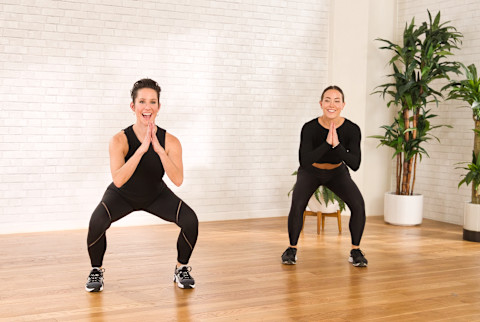How To Do Squats Properly To Strengthen Your Leg & Glute Muscles

When it comes to hitting the gym and targeting your glutes, the first exercise you likely think of is squats—and for good reason. This tried-and-true classic move is easy to modify for any fitness level, challenging a variety of muscles in your lower body with or without dumbbells.
BB Arrington, NASM-CPT, breaks down the mechanics of how to properly perform a squat so you can strengthen your body without getting injured. We're going back to the basics with this one.
How to do a squat.
Demonstrated by Mindy Lai.
- Stand with your feet about shoulder-width apart—your feet should be the distance apart that you would take to perform a vertical jump.
- Press your thighs away from each other as you lower your hips toward the floor, aiming for parallel or just below parallel.
- Keeping weight evenly distributed in your feet, push away the floor as you return to standing without letting your knees cave toward each other.
- That's one rep. Complete three sets of 10.
Form tips.
Squats generally target the glutes and quad muscles, but you'll still have to engage your core in order to stabilize your body throughout the movement. In the same vein, being mindful of muscle connection and staying aware of your lower-body positioning will ensure you're getting a functional burn.
"The bottom of the squat is the most important part, while your hips are under the most tension," explains Arrington. "At the bottom, be sure to stay active instead of resting and rounding the upper or lower back. If your tailbone tucks under at the bottom, you went too far."
Typically you should try to squat until your quads are parallel to the ground, but if your flexibility doesn't allow this, go as low as you can while keeping your form and making sure your knees don't dip in toward each other. Staying aware of your foot placement on the ground will also make sure you're achieving the proper squat form.
"For your standard squat, your knees should track in line with your second toe and move past the toes on the way down," explains Arrington. While this may change in other squat movements, this form will prepare you with a stable base.
Modifications and variations.
One of the most straightforward ways to modify squats for different fitness levels is adding or removing weight. If you're a beginner in the gym, starting out with a smaller set of dumbbells (or even just bodyweight) will help you practice the proper movement without risking injury. As you gain strength, you can graduate to heavier dumbbells or a barbell.
Beyond weights, changing the position of the squat or incorporating plyometrics (explosive movement, like a jump) can challenge your muscles in different ways.
Here are a few versions to try (and you can find a full list of squat variations here).
Goblet Squat
Demonstrated by BB Arrington, NASM-CPT.
- Stand with feet just outside shoulder width, holding the dumbbell tightly to your chest.
- Keeping tension in your torso, lower your hips below the height of your knees, and return to standing.
- Note: Be sure to keep toes and heels planted into the floor the entire time. Think about spreading the floor with your feet as you squat down and stand up to make room for your hips to lower.
Jump Squat
Demonstrated by Janeil Mason, M.S.
- Begin standing with feet hip-width apart.
- Hinge at the hips and send them back, lowering until your thighs are roughly parallel to the floor.
- From there, jump straight up out of the squat as high as you can.
- Land with a bit of slack in your knees, and then immediately get back into your squat position. Jump out again, and continue squatting and jumping.
- Complete three sets of 10 squat jumps.
Read more about jump squats here.
Split Squats
Demonstrated by Suki Clements, CPT.
- Start in a standing position, then step your left leg behind you. This is your starting position.
- Hinge slightly at your hips, bend your knees, and lower down. Keep your back heel up and your front heel down. Engage your glutes and quads to come back up to start.
- That's one rep. Complete 10, then repeat on the right side.
Read more about split squats here.
Add it to your routine.
Squats are one of the most popular lower-body exercises for a reason: because they work. Add a bodyweight variation to your warmup to engage your glutes and quads before throwing in some dumbbells, or integrate squats into your leg-day split with this high-energy 8-minute routine from Rachel Warren & Caitlin Riley:
If you're working out from home, this dumbbell-only workout from Arrington incorporates squats and other functional lower-body exercises to have you feeling the burn in no time.

